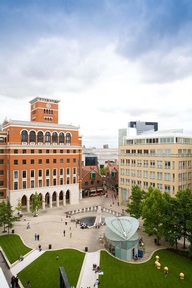Innovative social inclusion network secures 15 local council commitments
Fifteen local authorities have signed up to a National Social Inclusion Network, launched by Birmingham City Council and the Bishop of Birmingham after seeing positive results at a local level over the last two years.

The Network is focused on enabling towns and cities to work together in creating more inclusive environments that can work to overcome issues of social inequality, as well as allowing for joint campaigning to achieve a stronger collective community voice, and identifying actions that need to be taken.
Delighted that their local project looks likely to become a national one, Rt Revd David Urquhart, Bishop of Birmingham, comments:
“The strength of the Birmingham Social Inclusion Process which I have been chairing for the past two years is that it has not been simply about defining the problem, but instead, building a movement to drive forward the solutions that are needed to address the significant disadvantage that exists in our city. This is not just the responsibility of a few policy-makers but rather the opportunity for everyone to play their part as life-changers and hope-givers in the places they call home.
“Creating a national movement is another step in the process. The National Social Inclusion Network will provide an opportunity to bring together our experience and expertise, learn from each other and combine our efforts to build a strong collective voice to articulate the arguments for social inclusion for all our communities across the country.”
Collaborating with fairness and poverty commissions from around the country, the Network has agreed on eight key themes moving forward, these are: living wage and income; impact of welfare reform; fuel, finance and food; education and skills; youth employment; transport, access and affordability; democratic accountability; and housing.
During the first two years of the Network’s operations in Birmingham a number of key recommendations have already been set in action. These have included a Birmingham Fair Money campaign, focusing on the issues of high cost loans and unaffordable debt by helping credit unions expand and helping high cost lenders to grow.

A Place of Welcome network has also been established in the city, which offers information, advice and assistance for those who have relocated to Birmingham, while the University of Birmingham has also become involved, launching an Institute for Research into Superdiversity.
Councillor John Cotton, cabinet member for social cohesion and equalities, comments: “I entered politics to help people and I’m proud to say that this declaration represents a very real commitment to improving the lives of millions of people across the country. Even as we face up to unprecedented cuts, the councils signing up to the declaration are demonstrating a united commitment to those people who feel they have been marginalised for too long.
“It’s clear that we’re all facing similar challenges. Looking across the various fairness commission reports and frameworks that have been developed it is also clear that we all share a common determination to address deep-rooted issues of inequality and disadvantage and to deliver the changes needed.”
The other 14 councils to have signed a commitment to the Network are: Barrow-in-Furness, Bristol, Islington, Knowsley, Leeds, Leicester, Liverpool, Manchester, Newcastle, Plymouth, Sheffield, Southampton, Stoke-on-Trent and Tower Hamlets.
Latest News
 29-Jul-24
Dementia Bus gives carehome.co.uk staff insight into life with dementia
29-Jul-24
Dementia Bus gives carehome.co.uk staff insight into life with dementia
 01-Mar-24
Find out the top care homes in 2024
01-Mar-24
Find out the top care homes in 2024
 21-Mar-23
UK's top care homes in 2023 revealed
21-Mar-23
UK's top care homes in 2023 revealed
 03-Jan-23
carehome.co.uk launches free care helpline
03-Jan-23
carehome.co.uk launches free care helpline
 13-Dec-22
5 mins with Emily Whitehurst, chief operating officer for Constantia Healthcare
13-Dec-22
5 mins with Emily Whitehurst, chief operating officer for Constantia Healthcare